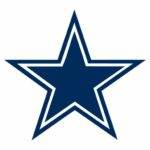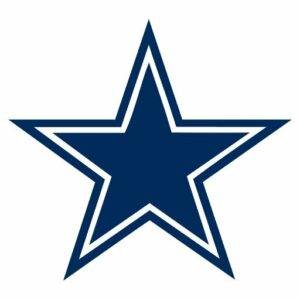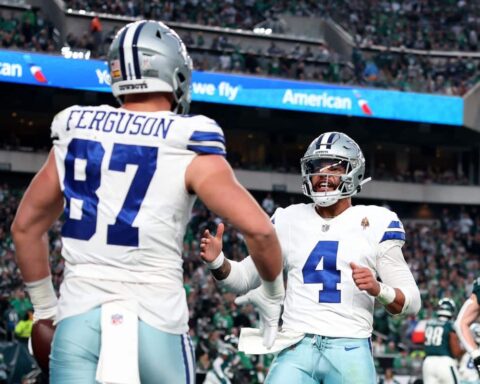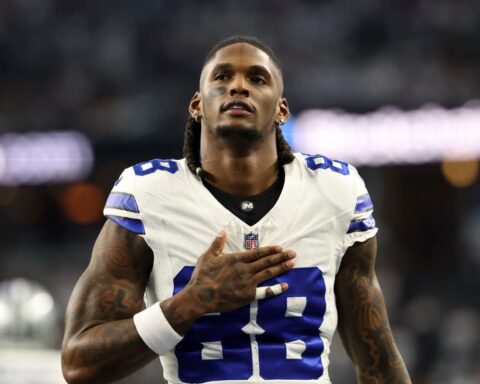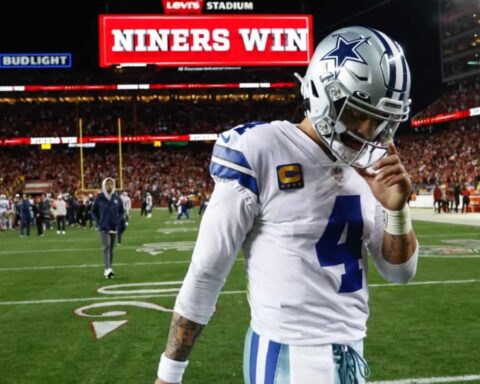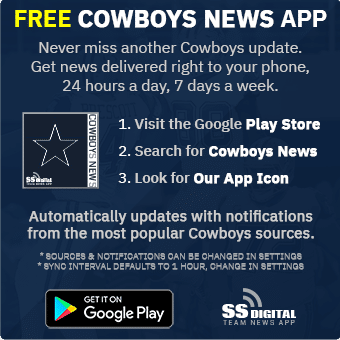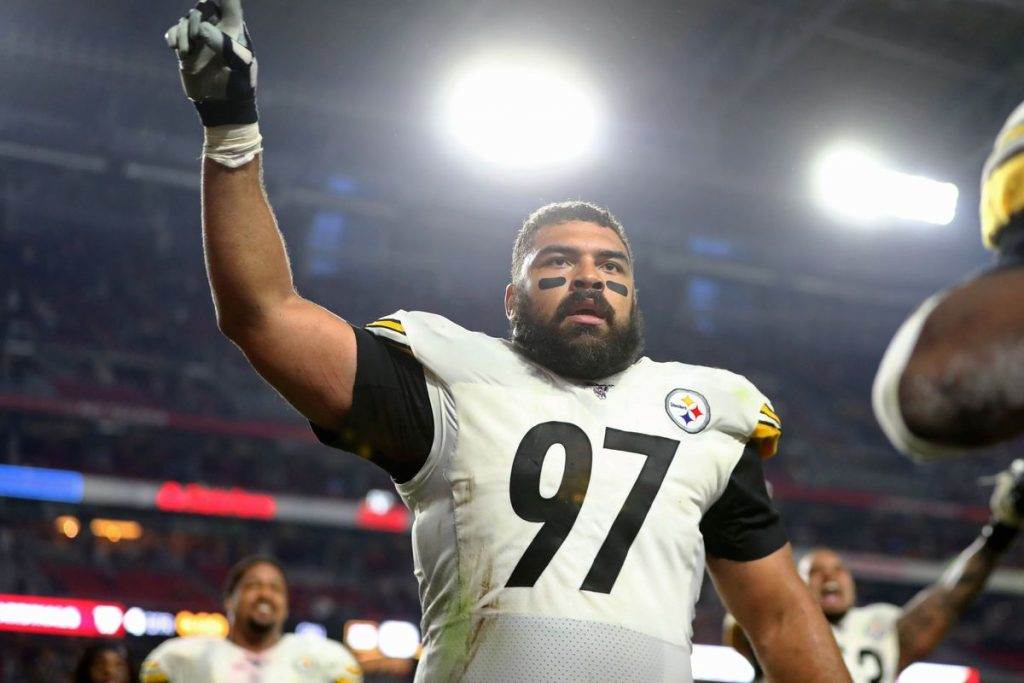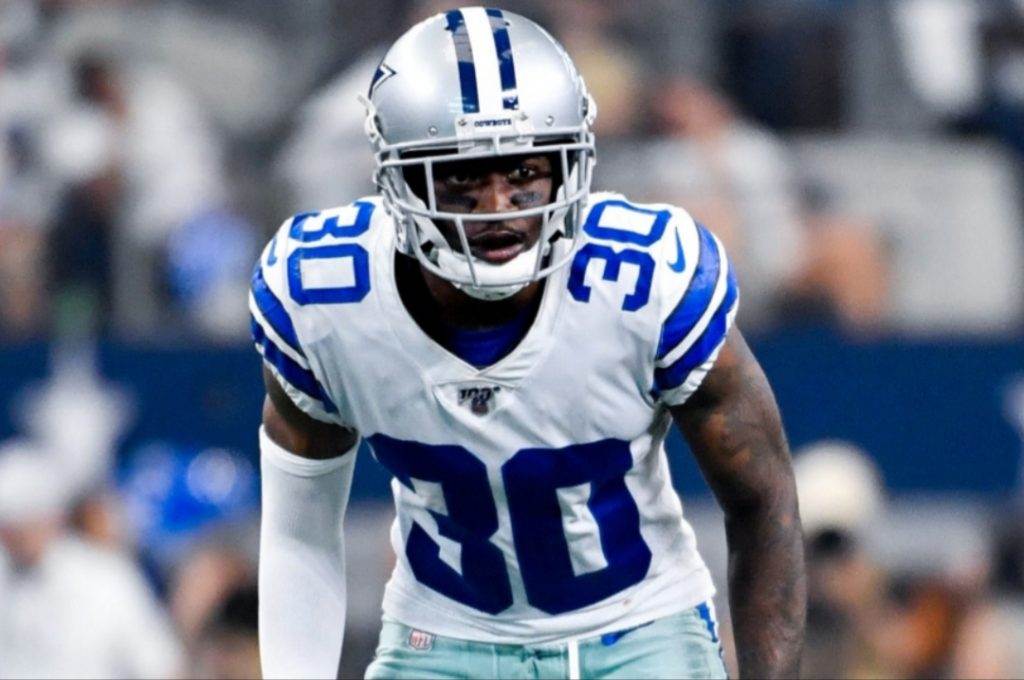The saga between Dak Prescott and the Dallas Cowboys over his future with the team is taking a step toward certainty, for 2020 at least, with Prescott reportedly signing his franchise tag tender today.
The Dallas Cowboys places the exclusive franchise tag on Dak Prescott back in March, just before the start of free agency. That tag locked Dak and the Cowboys into a $31.4 million cap hold for 2020. By signing the tag, Prescott is guaranteed that amount for 2020 if nothing else happens on his contract.
The signing of the tender removes any idea that Prescott could hold out of training camp or the regular season, which wouldn’t make any difference after the July 15th deadline. Though it was never a reality, it was still a topic of discussion.
More immediately, Prescott signing the tag brings him back into the fold, joining his teammates in preparation for the 2020 season.
It had been reported that Prescott would not participate in the virtual workouts. Though the Dallas Cowboys have a new head coach, a holdout didn’t affect Prescott as much with Kellen Moore retained as the offensive coordinator and play-caller. According to Head Coach Mike McCarthy, the offense and terminology would remain largely the same, though they would incorporate some west coast themes into the offense.
NFL teams are beginning to open their facilities in anticipation of training camp, which typically beings in the second half of July. Because the Dallas Cowboys have a new head coach, they’re allowed to begin training camp earlier than other teams. Slated to face the Pittsburgh Steelers in the Hall of Fame Game, the Cowboys will be granted a head start on the rest of the NFL.
The move for Dak Prescott won’t change his and his representation’s desire to acquire a long-term contract from the Dallas Cowboys. And that deal remains an integral part of their future for the Cowboys as well. A long-term commitment is still priority number one for both sides. Even with the franchise tag in place, neither Prescott nor the Cowboys front office has wavered in their belief and commitment that a long-term contract will come to fruition.
The current global-health climate related to the COVID-19 pandemic has put the future of the NFL’s revenue into question and could affect Prescott’s long-term contract aspirations.
With the likelihood that games will be played in 2020 without fans in the stands, the outlook of the 2021 salary cap looks bleak. The salary cap figures from year-to-year are based on the league’s revenue from the previous year. If there aren’t fans in attendance for 16 games plus the playoffs and Super Bowl, the NFL takes a big hit in revenue, which would likely affect the salary cap in 2021. Adam Schefter of ESPN reports that the salary cap could be cut $30 to $80 million in 2021. That doesn’t even figure in the growth of the salary cap that teams were expecting for 2021. The cap has generally grown by $8 to $10 million a year over the last five years.
That could mean anywhere from $40 to $90 million less than what teams were expecting for the 2021 season.
As Dak Prescott is projected to see anywhere from $33 to $37 million a year on his long-term contract, COVID-19 and the potential for salary cap regression make negotiations much more complicated.
In their negotiations, it’s likely they’ve discussed everything from projected television revenue on the next deal with the networks as well as the potential growth of the cap under the new TV deal, which was expected to grow as much as $40 million over the next couple of years. However, with the latest projections in the wake of COVID-19 coming to the table, the numbers are completely thrown off.
A lot would have to change in the global health crisis we’re facing for fans to be able to return to the stands. Even if states allowed it, there’s no guarantee that these stadiums would be sold out. To entice people into the seats, owners may have to cut prices on admission, parking, and concessions. All of which cut into their projected revenues and, in turn, the projected salary cap.
All of that will have an impact when the two sides are at the table. The unknown of the salary cap in future years creates an unknown as to how much Dak Prescott should earn. It’s possible that COVID-19 will create a negative reset of the market for all positions, even quarterback. Teams that are over the cap or close to the ceiling in 2021 will need to get creative to avoid losing their high-priced stars.
It’s possible that Prescott and his representatives see the path for the biggest payday to be to play on the franchise tag this year and possibly in 2021, then cash in with a new television agreement in the 2022 offseason.
A long-term deal is still the most advantageous position for the Dallas Cowboys as it gives them more contract flexibility, however without knowing what to expect with the 2021 and 2022 salary caps, it lingers like a storm cloud over the negotiations.
Both sides are still motivated to find an agreement to a long-term contract extension. Dak Prescott wants to be with the Dallas Cowboys, and the Cowboys want Prescott as their quarterback. That hasn’t changed. It’s still very likely that a deal gets done before the July 15th deadline. The effects of COVID-19 just complicates things a bit for both sides.
